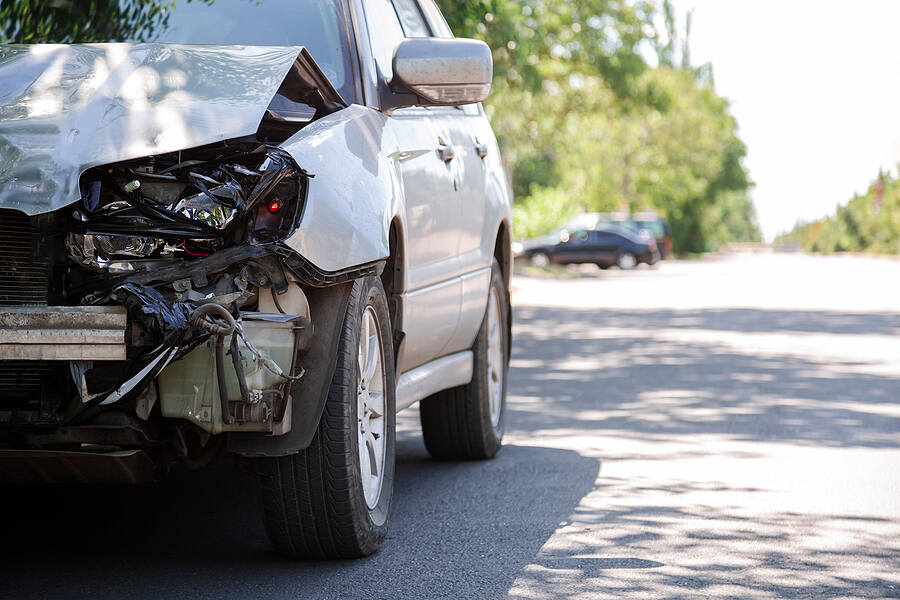
Getting into a car accident takes a heavy physical, emotional and financial toll, but will you also have to deal with going to court?
Probably not. Nationwide, most car accident claims resolve in an out-of-court settlement between the car accident victim and the at-fault party’s liability insurance company. That’s because court trials are expensive and time-consuming for everyone involved, which creates a strong incentive for the parties to agree long before a trial becomes necessary.
Of course, there are exceptions. The car accident cases that go to court are often (but not always) the most complicated or hotly contested, such as when the crash led to severe injuries or fatalities, or when there’s a major dispute over who was at fault or how much money the victims should receive.
Why a Car Accident Settlement Is (Usually) Preferable
In the vast majority of car accident cases, the at-fault party’s insurance company picks up the tab not just for the crash victims’ damages, but also for the at-fault party’s legal fees.
Insurance companies don’t spend money unless they have to. More often than not, they prefer to use their funds to settle a car accident case than to fight it. Additionally, settlements usually serve accident victims’ interests. Here are a few of the reasons why.
Settlements Often Get You Paid Faster
Car accident victims often deal with expensive medical bills and the missed income when they can’t work. They need compensation for their damages sooner rather than later so they can move on with their lives and put the accident behind them.
It can take weeks or months to iron out the details of a negotiated settlement, but that’s still a lot less time than going to court. Plus, even after a trial ends, there’s often the possibility of the losing party appealing the jury’s verdict, which can add even more time to the process.
Trials Can Take an Emotional Toll
Many accident victims find that going through a court trial is exhausting and emotionally draining. Given the choice, they’d prefer to avoid that strain, especially if it also means not having to sit on a witness stand and answer questions from a defense lawyer.
Of course, it’s not always the victims’ choice. In some cases, going to trial still represents the best option for getting a victim the money they need to pay for their care and rebuild their lives, even with the added stress. When that happens, experienced car accident lawyers know how to prepare their clients for the experience of trial, so that they can get through with as little stress as possible.
Trials Are Unpredictable
You can never know in advance how a trial will turn out. It’s an inherently unpredictable process to leave the decision to a judge or a jury. In that sense, a trial is more of a roll of the dice, whereas a settlement is a sure thing.
Getting compensation through a settlement is also usually more straightforward than collecting a judgment or jury award after a trial (assuming you win). Once the car accident victim and the defendant’s insurance company agree on a settlement amount and sign an agreement, funds will typically arrive very shortly thereafter.
Winning a case in court, in contrast, gives the car accident victim the right to receive money from the at-fault party or that party’s insurance company, but doesn’t guarantee that the money will arrive right away. For one thing, the defendant can potentially appeal. For another, the car accident victim’s lawyer may need to take additional legal action to secure the funds that were awarded at trial.
Why Some Car Accident Cases Should Go to Court
Nonetheless, the advantages of settling outside of court are contingent on the insurance company making an offer that fairly compensates you. Sometimes, going to court is the far better option for the car accident victim, such as in the scenarios described below.
For that reason, it’s always important for victims to hire a car accident lawyer who has a track record of case results involving both settlements and winning cases in the courtroom. That way, no matter what direction a case takes, the victim can rest assured of having the best legal representation possible.
#1. Catastrophic Injury Cases
The most serious car crashes can lead to severe injuries that will change a victim’s life forever. Lawyers refer to these as catastrophic injury cases.
Common catastrophic injuries in car accident cases include spinal cord injuries, severe burns, and brain injuries. The long-term effects of these injuries can prevent a car accident victim from working, going to school, or living the life they were once able to. They also usually burden victims and their families with huge, lifelong expenses.
For those reasons, car accident victims who suffer catastrophic injuries often have the right, and the need, to demand large amounts of compensation—sometimes running into the millions of dollars. This, unfortunately, gives at-fault parties and their insurance companies reasons to fight harder than they otherwise might, and resist settling for a fair amount of money.
As a result, going to trial can frequently represent the best option for car accident victims with catastrophic injuries.
#2. Car Accidents Where a Business Is the At-Fault Party
Car accidents in which a business, rather than an individual, is the at-fault party, may need to go to court to reach the outcome the car accident victim deserves.
Why? It has to do with liability insurance policy limits, which often set the upper boundary on how much money the car accident victim can expect to receive by taking legal action. When the at-fault party has relatively low insurance policy limits, it lowers the stakes for the insurance company and increases the chances that the case will settle. When the at-fault party has relatively high liability insurance limits, the money at stake increases and the insurance company has more incentive to fight.
On average, commercial liability insurance policies carried by businesses have higher limits than the auto accident liability insurance policies carried by individuals. So, if a business is at-fault for a car accident victim’s injuries, odds are higher that the business and its insurer will fight the case and it will end up in court.
#3. Complicated, Multi-Party Car Accident Cases
Some car accidents, like a pileup on the interstate, affect multiple victims at once. Each victim may have a legitimate claim for damages against the at-fault party or parties.
That raises the stakes for everyone. Victims may need to move quickly to get in line for compensation. At-fault parties facing multiple, high-dollar claims may take legal action to avoid liability, such as by seeking bankruptcy protection or by pointing the finger at (and even suing) each other.
In short, as a general rule, the more parties you have involved in a case, the more complicated it can be to get it resolved. For that reason, complicated, multi-party car accident cases have a higher-than-average likelihood of ending up in court.
#4. When the Victim Wants a Day in Court
Finally, sometimes a car accident case must go to court because that’s what the car accident victim needs. Crashes are traumatic experiences, especially if the at-fault party engaged in extremely recklessness and/or negligent misconduct. For some car accident victims, going to court feels like the only way to gain closure.
Talk to your car accident attorney about your hopes and goals for pursuing a car accident claim. If going to trial is something you feel you need, it’s best to let the attorney know early, because it can affect your attorney’s strategy for approaching the case. And don’t be surprised if your attorney tries to persuade you that settlement might still be your best option. Your attorney’s job is to represent your interests, and that includes giving you straightforward advice about your chances in and out of the courtroom.
How do you know if it’s worth it to go to court instead of settling?
Car accident victims often face a choice about whether to accept a settlement offer or to go to court to press for more. How do they decide?
The short answer is, they rely on the advice and experience of their attorney. The long answer is that their attorney will conduct a detailed analysis of the strengths and weaknesses of their case, and advise them about the potential risks and benefits of their options moving forward. That analysis usually breaks down into a few core questions.
How much does the car accident victim have the right to seek damages?
Generally speaking, car accident victims have the legal right to receive compensation for the following broad categories of damages:
- Past and future medical expenses related to their car accident injuries
- Past and future non-medical expenses flowing directly from the car accident and their injuries
- Any loss of wages and income caused by the car accident and their injuries
- The physical pain, emotional distress, and overall negative life impacts they’ve suffered because of the car accident and their injuries
- Any exemplary damages the law allows them to seek as punishment for the at-fault party’s extreme misconduct. Keep in mind that exemplary damages are often limited to extreme circumstances and usually unavailable in ordinary motor vehicle accidents.
A car accident victim’s lawyer will typically work with the victim and, when appropriate, subject matter experts, to calculate each of these categories. The total tally represents the amount of money that, in an ideal world, the victim would receive as full compensation for the injuries and losses that the car accident caused.
What’s the most the victim could get from the at-fault party?
Unfortunately, we don’t live in an ideal world. In the real world, at-fault parties can’t always pay every last penny that the car accident victim has the right to receive. A skilled car accident lawyer needs to take the potential financial limitations of the at-fault party into account when evaluating a settlement offer.
Most often, in car accident cases, the at-fault party’s liability insurance policy sets the top-end limit on how much money the victim can hope to obtain as damages. In some cases, the victim may also have assets that the victim’s lawyer can seize to satisfy a claim.
A lawyer for the car accident victim will typically explore all potential payment sources to determine the maximum money the at-fault party could theoretically pay. Sometimes, that amount will exceed the victim’s damages, which means the victim might receive 100 percent of their claim.
Sometimes, however, the amount is less than the victim’s total damages, which means the victim may not have any realistic shot at receiving the full value of what the law entitles them to get.
How strong is the claim and what are the odds of success if it goes to court?
The final piece of the analysis involves the lawyer taking an objective look at the strengths and weaknesses of the car accident victim’s claim. That may involve evaluating the amount and quality of the evidence the lawyer can present to prove the victim’s right to receive damages from the at-fault party, and the potential difficulty or complexity involved in presenting a claim in court. The ultimate goal is to try to assess the victim’s chances of success if the case ended up in a courtroom so that the attorney may advise the client accordingly.
Why do this? Because as we said above, a settlement is a sure thing, while going to court is a gamble. Weighing a settlement offer often means asking, “Does this settlement amount reflect the amount we think we deserve to get from the at-fault party, discounted by the odds of actually getting it in court?” If the answer is yes, then it may make sense to take the offer. If the answer is no, then it may make sense to go to court.
Talk to a Car Accident Lawyer Near You About Your Case
Want to know more about your options for getting paid for the injuries and losses you suffered in a car accident? Talk for free with an experienced car accident lawyer today.







